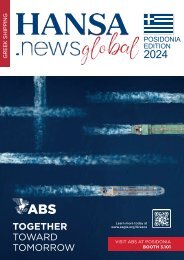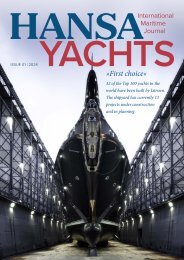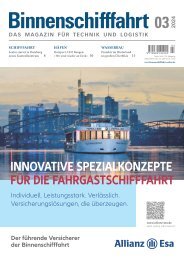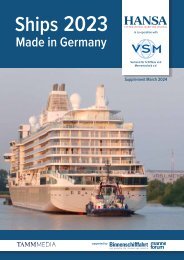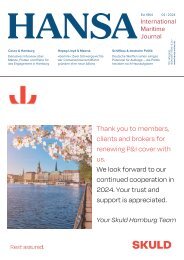HANSA 11-2022
Rostocker Großmotorentagung | Tankmessung | Bunkermarkt & Kraftstoffe | Makler & Eisbeinessen | Russland-Sanktionen | MSC | Chinese Leasing | HANSA-FORUM 2022
Rostocker Großmotorentagung | Tankmessung | Bunkermarkt & Kraftstoffe | Makler & Eisbeinessen | Russland-Sanktionen | MSC | Chinese Leasing | HANSA-FORUM 2022
Erfolgreiche ePaper selbst erstellen
Machen Sie aus Ihren PDF Publikationen ein blätterbares Flipbook mit unserer einzigartigen Google optimierten e-Paper Software.
SCHIFFFAHRT | SHIPPING<br />
»As the number one we do need to lead«<br />
Executive Vice President Bud Darr represents MSC, the world’s leading liner company, in<br />
maritime policy and government affairs – for both the cargo and cruise branch. To accelerate<br />
decarbonization of shipping, more efforts are needed, he says in an interview with <strong>HANSA</strong><br />
Mr. Darr, we are talking on the occasion of<br />
the German »Schifffahrtstag« in Bremen.<br />
What’s your impression of today’s conference<br />
and what was the reason for you to<br />
come to Germany?<br />
Bud Darr: Germany is a very important<br />
market for us also, in particular, with regard<br />
to the environmental issues including decarbonization.<br />
So it was a good fit to spend<br />
some time with the local community and<br />
talk about things of mutual importance.<br />
Sustainability has been one of the core<br />
topics if not the motto of today’s conference.<br />
What is the overall strategy of MSC when it<br />
comes to reaching climate goals, rebuilding<br />
the fleet and using alternative fuels?<br />
Darr: We have a net-zero target for 2050. We<br />
will get there through the way we power our<br />
ships, not relying on extra law settings. We<br />
are making investments today, we are working<br />
on partnerships with current and future<br />
energy providers to make sure that we have a<br />
supply of multiple fuels, and we are also making<br />
advances on both the new and the existing<br />
fleet with regard to energy efficiency and<br />
technologies that can be used to improve<br />
that. Because every gramme of fuel that is not<br />
consumed today is 3.2 gramme of CO2 that is<br />
not emitted in the atmosphere. We are working<br />
on all these topics simultaneously.<br />
© Scheer<br />
MSC was blamed several times by the NGO<br />
»Transport & Environment« for being one<br />
of most emission-producing companies in<br />
the world. How do you comment on this?<br />
Darr: These arguments have something true<br />
about it. But, the demand for our services<br />
has grown strongly. That’s how we moved<br />
from number 2 to number 1, to become the<br />
largest liner carrier in the world. So there is a<br />
lot of fuel consumed and GHG emitted in<br />
our network. But on a per-unit-basis for carbon<br />
intensity we have consistently make improvements<br />
over time and we continue to<br />
make improvements. The real breakthrough<br />
for us is going to come through alternative<br />
fuels, which are not yet available.<br />
The other thing is: the data that is relied<br />
upon for some of these comments were made<br />
for Europe, and we have a really big physical<br />
footprint in Europe. And we tend to operate<br />
26 <strong>HANSA</strong> – International Maritime Journal <strong>11</strong> | <strong>2022</strong>




